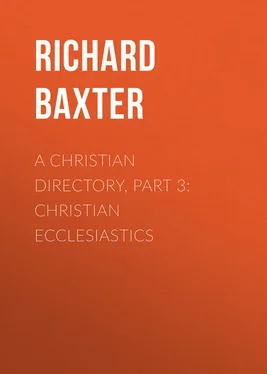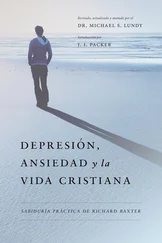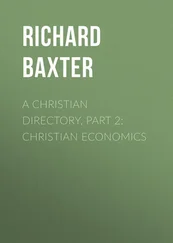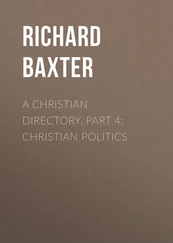Richard Baxter - A Christian Directory, Part 3 - Christian Ecclesiastics
Здесь есть возможность читать онлайн «Richard Baxter - A Christian Directory, Part 3 - Christian Ecclesiastics» — ознакомительный отрывок электронной книги совершенно бесплатно, а после прочтения отрывка купить полную версию. В некоторых случаях можно слушать аудио, скачать через торрент в формате fb2 и присутствует краткое содержание. Жанр: foreign_antique, foreign_prose, на английском языке. Описание произведения, (предисловие) а так же отзывы посетителей доступны на портале библиотеки ЛибКат.
- Название:A Christian Directory, Part 3: Christian Ecclesiastics
- Автор:
- Жанр:
- Год:неизвестен
- ISBN:нет данных
- Рейтинг книги:3 / 5. Голосов: 1
-
Избранное:Добавить в избранное
- Отзывы:
-
Ваша оценка:
- 60
- 1
- 2
- 3
- 4
- 5
A Christian Directory, Part 3: Christian Ecclesiastics: краткое содержание, описание и аннотация
Предлагаем к чтению аннотацию, описание, краткое содержание или предисловие (зависит от того, что написал сам автор книги «A Christian Directory, Part 3: Christian Ecclesiastics»). Если вы не нашли необходимую информацию о книге — напишите в комментариях, мы постараемся отыскать её.
A Christian Directory, Part 3: Christian Ecclesiastics — читать онлайн ознакомительный отрывок
Ниже представлен текст книги, разбитый по страницам. Система сохранения места последней прочитанной страницы, позволяет с удобством читать онлайн бесплатно книгу «A Christian Directory, Part 3: Christian Ecclesiastics», без необходимости каждый раз заново искать на чём Вы остановились. Поставьте закладку, и сможете в любой момент перейти на страницу, на которой закончили чтение.
Интервал:
Закладка:
Rule XXIV. The actus jurandi must still be distinguished from the materia juramenti ; and it very often cometh to pass that the act of swearing (or the oath as our act) is unlawfully done, and was a sin from the beginning, and yet it is nevertheless obligatory as long as the res jurata , the matter sworn, is lawful or necessary. 75 75 Sanders. p. 55, 56. In quo casu locum habet quod vulgo dicitur, Fieri non debet, factum valet: possumus ergo distinguere, juramentum dici illicitum duobus modis. Vel respectu rei juratæ, vel respectu actus jurandi: Juramentum illicitum respectu rei juratæ nullatenus obligat: Juramentum illicitum respectu actus jurandi obligat, nisi aliunde impediatur.
Dr. Sanderson instanceth in Joshua's oath to the Gibeonites. The nature of the thing is proof enough; for many a thing is sinfully done, for want of a due call, or manner, or end, that yet is done, and is no nullity. A man may sinfully enter upon the ministry, that yet is bound to do the duty of a minister; and many marriages are sinful that are no nullities.
What is the nullity of an oath.
Rule XXV. The nullity of an oath ab initio , is quando realiter vel reputative non juravimus ; when really or reputatively we did not swear. The sinfulness of an oath is when we did swear really but unlawfully as to the ground, or end, or matter, or manner, or circumstances. Really that man did not swear, 1. Who spake not (mentally nor orally) the words of an oath. 2. Who thought those words had signified no such thing, and so had no intent to swear either mentally or verbally. As if an Englishman be taught to use the words of an oath in French, and made believe that they have a contrary sense. 3. Who only narratively recited the words of an oath, as a reporter or historian, without a real or professed intent of swearing. Reputatively he did not swear, 1. Who spake the words of an oath in his sleep, or in a deliration, distraction, madness, or such prevalent melancholy as mastereth reason; when a man is not compos mentis , his act is not actus humanus . (2.) When a man's hand is forcibly moved by another against his will to subscribe the words of an oath or covenant; for if it be totally involuntary it is not a moral act. But words cannot be forced; for he that sweareth to save his life, doth do it voluntarily to save his life. The will may be moved by fear, but not forced. Yet the person that wrongfully frighteneth another into consent, or to swear, hath no right to any benefit which he thought to get by force or fraud; and so in foro civili such promises, or covenants, or oaths may quoad effectum be reputatively null; and he that by putting his sword to another man's breast doth compel him to swear or subscribe and seal a deed of gift, may be judged to have no right to it, but to be punishable for the force; but though this covenant or promise be null in foro humano , because the person cannot acquire a right by violence, yet the oath is not a nullity before God; for when God is made a party, he hath a right which is inviolable; and when he is appealed to or made a witness, his name must not be taken in vain. 3. It is a nullity reputatively when the person is naturally incapable of self-obligation, as in infancy, when reason is not come to so much maturity as to be naturally capable of such a work; I say naturally incapable, for the reasons following.
Rule XXVI. We must distinguish between a natural incapacity of vowing or swearing at all, and an incapacity of doing it lawfully; and between a true nullity, and when the oath is only quasi nullum , or as null quoad effectum , or such as I must not keep. There are many real oaths and vows which must not be kept, and so far are quasi nulla as to the effecting of the thing vowed; but they are not simply null; for they have the effect of making the man a sinner and perjured. They are sinful vows, and therefore vows. A natural incapacity proveth it no vow at all; but if I am naturally capable, and only forbidden, (by God or man,) this maketh it not no vow, but a sinful vow, of which some must be kept and some must not.
Cases in which a vow must not be kept.
In these following cases a real vow is quasi nullum , or must not be kept.
1. In case the thing vowed (all things considered) be a thing which God hath forbidden to be done; that is, in case it be a thing in itself evil; but if the thing in itself be a duty, though there be some inseparable sins which we shall be guilty of in the performance, we must not therefore leave the duty itself undone which we have vowed: as if I vow to praise God, and yet am sure that I cannot praise him without a sinful defect of that love and delight in him which is due, I must not therefore forbear to praise him; else we must cast off all other duty, because we cannot do it without some sin. But yet, though in case of unwilling infirmity, we must thus do the duty though we are sure to sin in it, yet in case of any chosen, voluntary sin, which we have an immediate power to avoid, we must rather forbear the duty itself (vowed or not vowed) than commit such a sin; as if I vow to preach the gospel, and am forcibly hindered unless I would voluntarily tell one lie, or commit one sin wilfully for this liberty; I ought rather never to preach the gospel; nor is it then a duty, but become morally impossible to me; as if in France or Spain I may not preach unless I would take Pope Pius's Trent confession or oath. Nay, if those very defects of love, and wandering thoughts, which now inseparably cleave to my best performances, were morally and immediately in my power, and I could avoid them, I ought not electively and by consent to commit them, for any liberty of duty, but rather to forbear the duty itself as no duty to me when it cometh upon such conditions; for then it is supposed that I could serve God better without that duty, because I could love him more, &c.
Yet here is observable a great deal of difference between omissions and commissions. A man may never commit a sin that good may come by it, though he vowed the good; but a man may ofttimes omit that which else would have been his duty, to do some good which he hath vowed; for negative commands bind semper et ad semper ; but the affirmative do not (at least as to outward duty); therefore in case of necessity a man may himself consent to the present omission of some good, for the escaping of greater, unavoidable omissions another time, or for the performing of a vow or greater duty which is to be preferred.
2. A vow is not to be kept, when the matter of it is unjust and injurious to another (unless you have his consent): as if you vow to give away another man's lands or goods, or to do him wrong by word or deed; or if you vow to forbear to pay him his due, or to do that which you owe him: as if a servant vow to forbear his master's work (unless it be so small an injury as he can otherwise repair); or a husband, or wife, or parents, or children, or prince, or subjects should vow to deny their necessary duties to each other. Here man's right together with God's law doth make it unjust to perform such vows.
3. A vow is as null or not to be kept, when the matter is something that is morally or civilly out of our power to do: as if a servant, or a child, or subject vow to do a thing, which he cannot do lawfully without the consent of his superior: this vow is not simply null, for it is a sinful vow (unless it was conditional). Every rational creature is so far sui juris , as that his soul being immediately subject to God, he is capable of obliging himself to God; and so his vow is a real sinful vow, when he is not so far sui juris as to be capable of a lawful vowing, or doing the thing which he voweth. Such a one is bound to endeavour to get his superior's consent, but not without it to perform his vow; no, though the thing in itself be lawful. For God having antecedently bound me to obey my superiors in all lawful things, I cannot disoblige myself by my own vows.
Читать дальшеИнтервал:
Закладка:
Похожие книги на «A Christian Directory, Part 3: Christian Ecclesiastics»
Представляем Вашему вниманию похожие книги на «A Christian Directory, Part 3: Christian Ecclesiastics» списком для выбора. Мы отобрали схожую по названию и смыслу литературу в надежде предоставить читателям больше вариантов отыскать новые, интересные, ещё непрочитанные произведения.
Обсуждение, отзывы о книге «A Christian Directory, Part 3: Christian Ecclesiastics» и просто собственные мнения читателей. Оставьте ваши комментарии, напишите, что Вы думаете о произведении, его смысле или главных героях. Укажите что конкретно понравилось, а что нет, и почему Вы так считаете.












